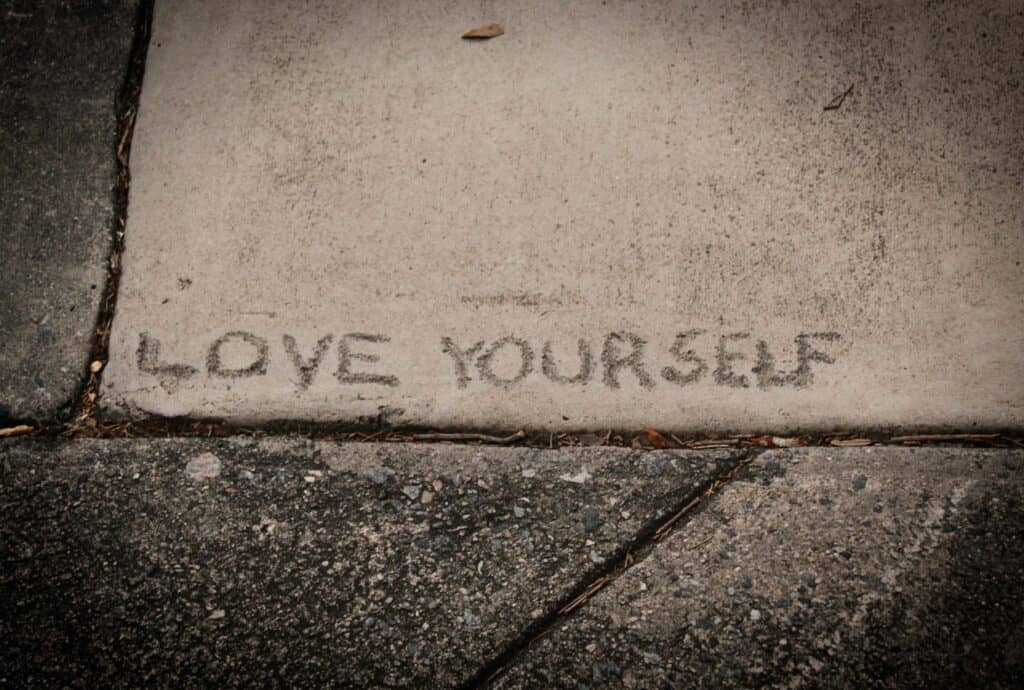- Your relationship with yourself is the most important relationship in your life
- So don’t get down in the dumps about being single – try to change your mindset and focus on loving yourself instead
- Here are some tips for practicing self-love

What is self-love?
Self-love has become something of a buzzword in recent years – but what does it really mean?
According to Dr. Andrea Brandt, “self-love means having a high regard for your own well-being and happiness. Self-love means taking care of your own needs and not sacrificing your well-being to please others. Self-love means not settling for less than you deserve.”
Self-love is often confused for narcissism, but that couldn’t be further from the truth. Self-love is not so much about being self-centred or arrogant – instead, it’s about making peace with and looking after yourself.

In this day and age, it’s normal to feel pulled in many different directions and feel as though your attentions are being spread thin. The upshot of this is that we’re more prone to deprioritising ourselves and neglecting our own needs.
Plus, with the rise of social media, it’s easy to feel as though everyone around you is in a perfect relationship and you’re the only person who’s still single. You should reframe being single as a choice you’re making – a choice to prioritise yourself and a refusal to settle for anything less than you deserve.
Why is self-love important?
While it’s problematic to insist that no one will love you until you love yourself, it’s still important that you try and nurture your relationship with yourself for your own benefit.

Speaking to Cosmopolitan, counsellor and member of the British Association for Counselling and Psychotherapy (BACP), Dee Johnson says: “investing in loving yourself builds self-respect, confidence, motivation, a desire to achieve good things for yourself, to connect with others, and the ability to put boundaries in place, such as saying no to toxic people.” So basically, self-love is really important.
If you feel like you don’t love yourself enough, don’t fret. Self-love is a skill – even people who seem super confident and happy in themselves have to continue working away at practicing self-love. Whether you just need a refresher or are starting from scratch, here are some tips on how to hone your self-love skills.
How to practice self-love
Stop comparing yourself to others
There’s a lot of truth in the saying “comparison is the thief of joy.”
As Alison Rachel Stewart puts it in Healthline: “We’re socialised to be competitive, so comparing ourselves to others is natural. But it can be dangerous.”

“There’s just no point in comparing yourself to anyone else on the planet because there’s only one you,” she continues. “Rather, focus on yourself and your journey. The shift of energy, alone, will help you feel free.”
Accept compliments
For many of us, it’s basically a reflex to deflect any compliments you receive. How many times have you said “oh my god, no I don’t!” when someone tells you you look good, or scrambled to hit the other person back with a compliment in response? How often have you simply said “thank you” and left it at that?

Speaking to Cosmopolitan, Johnson says: “When we dismiss a compliment (often with an embarrassed and rejecting response) we are reinforcing [the idea] that we are not worthy.”
She continued: “Accept that people value, admire or just like what you do, and over time accepting it from others has the same impact on [how you think about] yourself.”
Practice self-care
Modern life is busy, so it’s unsurprising so many of us struggle to make time for ourselves. But make yourself a priority again and ensure you earmark time just for you.
How you spend your me-time is up to you – perhaps you’d enjoy a nice long bubble bath or maybe you’d prefer going for a long walk by yourself. Maybe you’re long overdue a treat, so you could buy yourself a takeaway or those shoes you’ve been eyeing up for ages.

Whatever you decide to do, self-care is a great way to practise being a little kinder to yourself.
Repeat positive affirmations
Positive affirmations are another great way of introducing a little self-love into your life. It doesn’t matter so much how you ‘practise’ positive affirmations – you can speak them aloud, repeat them in your head, or write them down – but honing in on simple, positive mantras can really boost your self-esteem.
You can keep your affirmations simple or go for something a little more specific if there’s something in particular you’d like to work on. Influencer Chidera Eggerue’s mantra is “I am good enough, worthy enough and important enough to demand more.” Others suggested by Stylist include “There’s no place in my heart or mind for negative self-talk” or “I embrace my journey and show myself grace on a daily basis.”

Try and practice affirmations in mind first thing in the morning and as part of your night routine.
Let go of toxic people
It’s also important to let go of anyone holding your back in your journey towards loving yourself.
Writing for Psychology Today, Dr. Deborah Khoshaba says: “Bring the right people into your life. I love the term frenemies that I learned from my younger clients. It describes so well the type of ‘friends’ who take pleasure in your pain and loss rather than in your happiness and success.”

“My suggestion to you here: Get rid of them!,” she continues. “There isn’t enough time in your life to waste on people who want to take away the shine on your face that says, ‘I genuinely love myself and life.’ You will love and respect yourself more.”
Consider therapy or counselling
Maybe you’re still struggling and feel as though you’d benefit from counselling or therapy. Speaking to Cosmopolitan, Johnson explains that professional help may be the best course of action: “counselling is there to help you engage and understand yourself more.” She adds that it’s an opportunity to “process any negativity, low self-worth [and] self-rejection in an objective place.”

If you feel as though your self-esteem is seriously low, it could also be a sign of an underlying condition. Low self-esteem is a symptom of many different mental illnesses including depression and borderline personality disorder, so if you feel as though this may apply to you, don’t hesitate to make contact with your GP or another licensed professional.

